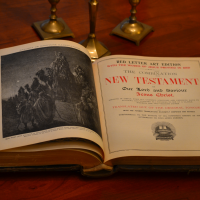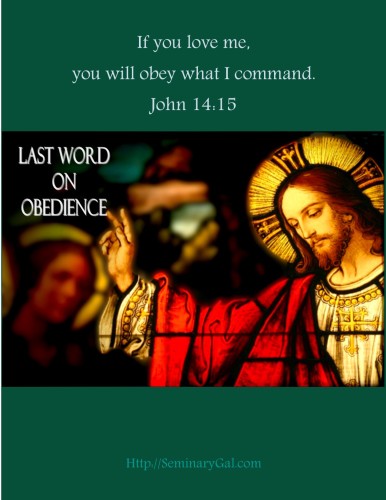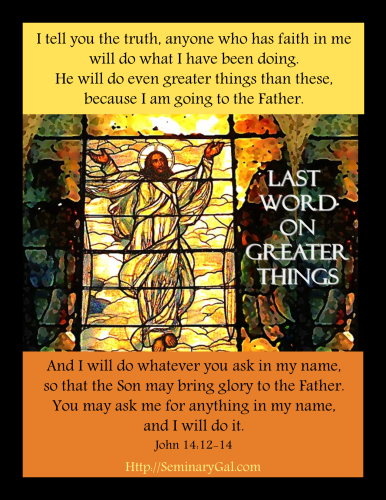What would you do if you were accused of a crime as an innocent person? That’s what Stephen faced. What would you do if you were falsely accused? Would you put up the best defense you possibly could? That’s what Stephen did. He’s dragged before the Sanhedrin and since they couldn’t stand up to his arguments and his angel face, boom!
Acts 6:13 They produced false witnesses, who testified, “This fellow never stops speaking against this holy place and against the law. 14 For we have heard him say that this Jesus of Nazareth will destroy this place and change the customs Moses handed down to us.”
Acts 7:1 Then the high priest asked him, “Are these charges true?”
“Are these charges true?” says the high priest. (Seriously? The high priest knows these are false witnesses! Of course their charges aren’t true, right?) “Are these charges true?” It’s like the proverbial loaded question, “Have you stopped beating your wife?” Likewise in this case, a simple Yes-or-No answer just won’t do.
 Rather than evading the question, Stephen takes them deeper into their question in order to point out two important considerations:
Rather than evading the question, Stephen takes them deeper into their question in order to point out two important considerations:
- When you start from the wrong place, don’t be surprised if your digging doesn’t bring you to the right conclusion.
- Customs and traditions have their place, but they are not the basis for whether God is being honored
These two considerations form the major themes, the Cliffs Notes, if you will, to the early part of Stephen’s defense.
So first, when you start from the wrong place, don’t be surprised if your digging doesn’t bring you to the right conclusion.
It reminds me of that scene from Indiana Jones in Raiders the Lost Ark where they’re in Egypt and they’re trying to dig up the Ark of the Covenant. He and his coworkers are speaking with an old man who reads the back of a medallion that states part of the staff on which the medallion will sit must be removed before using it. The enemy, a man named Balloq, was already digging away having used a replica of the medallion to find the precise digging location. But there was a problem:
- Indiana: Balloq’s medallion only had writing on one side? You sure about that?
- Sallah: Positive!
- Indiana: Balloq’s staff is too long.
- Indiana, Sallah: They’re digging in the wrong place!
When you start digging in the wrong spot don’t be surprised if you come up empty and end with the wrong conclusion. That’s what Stephen will show today in his answer. It’s not a simple yes or no because the high priest is starting from the wrong spot (the temple) when he should be starting with worship of God.
That’s the situation with the temple, but what about the second part of the accusation: the customs of Moses? Customs and traditions have their place, but they shouldn’t be the basis for whether God is being honored.
Traditions can lead us down the wrong path too. The Sanhedrin and all the religious leaders had accepted these customs as true by way of tradition that didn’t hold water in reality.
It reminds me of the woman who was preparing a ham at Easter and her little daughter asked her, “Mommy, why do you cut the end off the ham?” The mother said, “I don’t know. My mother always did it.” So the next time they were at grandma’s house, they asked her “Why do you cut the end off the ham?” and she said, “I don’t know. My mother always did it.” So great grandma came to dinner that afternoon and they all asked her, “Why do you cut the end off the ham?” and she said, “Because I never had a pan big enough otherwise.” We can easily make assumptions based upon traditions that don’t hold up under examination of the truth and the facts.
 So Stephen begins his defense against false accusations. His defense is not a politician’s evading of the question because Stephen doesn’t want to escape. He wants to be guilty as charged to a different accusation!
So Stephen begins his defense against false accusations. His defense is not a politician’s evading of the question because Stephen doesn’t want to escape. He wants to be guilty as charged to a different accusation!
Stephen wants to be found guilty of the true accusation of following Jesus of Nazareth!
When it comes to our being Christians, if our lives were on trial and our actions as exhibits in a criminal trial, would our lives show enough evidence to convict us as Bible-believing Christians? Stephen wants to be convicted of being a genuine disciple of Jesus.
So, with all that as our Cliffs Notes to Stephen’s speech so you can follow along, we’ll see why his defense is much longer than a simple yes or no answer. Stephen’s accusers
Acts 6:13 They produced false witnesses, who testified, “This fellow never stops speaking against this holy place and against the law. 14 For we have heard him say that this Jesus of Nazareth will destroy this place and change the customs Moses handed down to us.”
And the question “Are these charges true?”
2 To this [Stephen] replied: “Brothers and fathers, listen to me!
Remember Peter’s speech at Pentecost and how he began by using words of inclusion? Stephen is doing the same thing, returning to their Jewish roots, his and theirs: the patriarchs, the great founding fathers and heroes of the Jewish people. It gives common ground and reasons for them to agree. Keeping the customer agreeing is always good salesmanship and good apologetics and after all, who wouldn’t agree with:
2 To this he replied: “Brothers and fathers, listen to me! The God of glory appeared to our father Abraham while he was still in Mesopotamia, before he lived in Haran. 3 ‘Leave your country and your people,’ God said, ‘and go to the land I will show you.’
The Sanhedrin don’t realize it yet, but Stephen points out that the temple he’s being accused of maligning hasn’t always been around, that worship of God happened long before that and in a variety of places. Clearly worship of God happened even before the land was the land of the Jews.
How could worship happen only at a holy place, a temple in Jerusalem, when God appeared to Abraham to start the faith in Mesopotamia, not even here in Jerusalem?
So Stephen continues: 4 “So [Abraham] left the land of the Chaldeans and settled in Haran. After the death of his father, God sent him to this land where you are now living. 5 He gave him no inheritance here, not even a foot of ground. But God promised him that he and his descendants after him would possess the land, even though at that time Abraham had no child.
Worship happened in Mesopotamia in the Chaldeans, and later in Haran. Furthermore, God was worshiped by Abraham, the great patriarch, even before the second patriarch, Isaac, was even born. God has been worshiped in foreign lands long before He was worshiped in Jerusalem, even before Israel was Israel. Jacob the patriarch of the 12 tribes hadn’t even been born yet. (As a teaser for weeks to come, this is setting the stage for the Gospel going to the Gentile world.)
Worship of God was not restricted then, why should it be restricted now… to a place?
Stephen goes on telling their history and speaking logic: 6 God spoke to [Abraham] in this way: ‘Your descendants will be strangers in a country not their own, and they will be enslaved and mistreated four hundred years. 7 But I will punish the nation they serve as slaves,’ God said, ‘and afterward they will come out of that country and worship me in this place.’
That’s Egypt that God was talking about when He referred to “the country…and the nation”. The same Egypt where Moses would be born. But at the time God promised it, there was no Moses. More than 400 years spanned the time told to Abraham from the enslavement to the exodus which is a long time after Abraham.
You see, what’s happening is that Stephen is getting the Sanhedrin to agree with the history of the Jews and is leading them to a “yes” answer to the real question of where worship takes place: God is too big to be contained in a temple.
God is too big to be contained in a temple.
But what about that whole idea of the customs of Moses? Do you, Stephen have a defense for that?
Worship at the temple had just become so much of a routine for the Jewish leaders that they never stopped to consider that worship of God had been going on for a really long time in many different places before the temple was ever even built! And the customs of Moses didn’t even show up for many years after the patriarchs. The customs just developed after Moses was leader. The Law itself was good, but by now, a bunch of things were added to the Law to where the spirit of the Law was muddled. People followed the customs because of tradition.
It reminds me of that scene from A Few Good Men where Defense Attorney Kaffee is offering a rebuttal to Jack Ross’s assertion that Code Reds aren’t part of a Marine’s obligation at Gitmo because it’s not in the book. On the stand is Cpl. Barnes.
- Kaffee: Corporal, would you turn to the page in this book that says where the mess hall is, please.
- Cpl. Barnes: Well, Lt. Kaffee, that’s not in the book, sir.
- Kaffee: You mean to say in all your time at Gitmo you’ve never had a meal?
- Cpl. Barnes: No, sir. Three squares a day, sir.
- Kaffee: I don’t understand. How did you know where the mess hall was if it’s not in this book?
- Cpl. Barnes: Well, I guess I just followed the crowd at chow time, sir.
We just follow the crowd at worship time. There are traditions and customs given us by God in His Word and ones we’ve just followed because the people ahead of us did them. But there are some given by God directly and the Law eventually through Moses, long after Abraham.
8 Then [God] gave Abraham the covenant of circumcision. And Abraham became the father of Isaac and circumcised him eight days after his birth. Later Isaac became the father of Jacob, and Jacob became the father of the twelve patriarchs.
The Sanhedrin could not argue with Stephen’s recounting of early Jewish history. They were probably nodding in agreement all along, completely unaware that Stephen’s argument was building the case and leading them to a place where they must acknowledge this truth: worship of God, is not something new, or local, or geographical. Stephen is reclaiming worship that is something very old. It’s revolutionary…because it bucked with current tradition….but it was not a new truth at all.
 The Bible is like that.
The Bible is like that.
Filled with truths we rediscover anew with extended reading.
God is not confined to a geographical land, or a temple made by human hands. God has never set up holy sites or shrines like people will set up to various fake deities. So the accusation regarding the destruction of the temple wasn’t blasphemy because it never contained God to begin with. It was just a building. God is too big and the temple itself was never to substitute for God.
When you stop to think about a pilgrimage, like Muslims to Mecca, what does that say about their view of their god? Small. Local. Not a god at all. Pilgrimages and temples and customs risk substituting something we can do for who God is. Our God is not manmade! The temple? Just a place to worship alongside others. Customs of Moses? Just things to help us remember how to worship. Neither one is an acceptable substitute for the living God and the outreaching Gospel of Good News to an entire world–a universe really– in which God is at work and worthy of worship.
So what about us? I read a blog post this past week from a pastor about the painful process of closing a church. Pastor John Frye writes,
Last Sunday the local church where I have served as pastor for nine years closed…the decision to close was a “severe mercy.” Severe in that it is always hard to end a church’s history and merciful because the faithful folks who hung in to the end were fatigued and needed a clear, sharp decision about their future….As the ministry entered into its final two years, issues in the church’s DNA, frictions with members, and the inability of the church to negotiate healthy change, the church entered into what our denomination calls an “at risk” status. Using a medical metaphor, the church went into cardiac arrest and was on life support in the last eight months to a year. It’s hard to get a church on life support to become more missional. Energy levels drop and morale flounders. I came to a hard realization: churches do die and this one was dying under my care.
It was a longstanding church in a different denomination. The people were exhausted. Nice, but exhausted. There was no missional, outward looking to share the Gospel. Nice people with a largely empty building and rather empty traditions, a sort of temple-and-customs-of-Moses. Poor substitutes for the Living God.
What about us? Worship of God will go on, even if Plymouth were to close its doors, so long as there are people whose focus is on worship. I will continue to worship God (Father, Son, and Holy Spirit) wherever I can as would be the case for all who worship God. Much of what we do isn’t related to worship at all. It’s not just us. It’s at many, if not most, if not all churches in the US.
In America, in our largely comfortable lives, we’re comfortable with all temple and customs of Moses and remarkably little of the Spirit of God who brings life to the Church.
The famous author AW Tozer once said,
If the Holy Spirit was withdrawn from the church today, 95 percent of what we do would go on and no one would know the difference. If the Holy Spirit had been withdrawn from the New Testament church, 95 percent of what they did would stop, and everybody would know the difference.”
This is what is radical about Stephen’s defense: worship has always been about God and wherever we engage in true worship of Him—in spirit and in truth, the kind of worshipers the Father seeks, Jesus says (John 4:23). This type of worship? The world would notice if we stopped. At least that’s how the early church was. The temple? The customs of Moses? Stephen, with his knowledge of the Scriptures and Jewish history, his deep faith, and his radical defense… Stephen wanted to be “Guilty as Charged,” of worshiping God in spirit and in truth which beats the temple and Moses any day of the week and twice on Sunday. Let’s pray.
 How often we fail to see how greatly Jesus looked forward to being freed from the constraints of the Incarnation and the immense joy He had anticipating a return to His Father!
How often we fail to see how greatly Jesus looked forward to being freed from the constraints of the Incarnation and the immense joy He had anticipating a return to His Father! I love the Holy Spirit. I’ve often called Him the best kept secret of Evangelical Christianity.
I love the Holy Spirit. I’ve often called Him the best kept secret of Evangelical Christianity. Rather than evading the question, Stephen takes them deeper into their question in order to point out two important considerations:
Rather than evading the question, Stephen takes them deeper into their question in order to point out two important considerations: So Stephen begins his defense against false accusations. His defense is not a politician’s evading of the question because Stephen doesn’t want to escape. He wants to be guilty as charged to a different accusation!
So Stephen begins his defense against false accusations. His defense is not a politician’s evading of the question because Stephen doesn’t want to escape. He wants to be guilty as charged to a different accusation! The Bible is like that.
The Bible is like that.  He’s alive but He’s going away and because He lives they will live. (Huh? Wait a minute. Is there a death in here we don’t know about? We’re totally confused!!)
He’s alive but He’s going away and because He lives they will live. (Huh? Wait a minute. Is there a death in here we don’t know about? We’re totally confused!!)
 Today’s final instruction
Today’s final instruction  John 14:12 I tell you the truth, anyone who has faith in me will do what I have been doing. He will do even greater things than these, because I am going to the Father. 13 And I will do whatever you ask in my name, so that the Son may bring glory to the Father. 14 You may ask me for anything in my name, and I will do it.
John 14:12 I tell you the truth, anyone who has faith in me will do what I have been doing. He will do even greater things than these, because I am going to the Father. 13 And I will do whatever you ask in my name, so that the Son may bring glory to the Father. 14 You may ask me for anything in my name, and I will do it. Then, BOOM!
Then, BOOM!  Desperately seeking a destination.
Desperately seeking a destination.